Alumni Academy
Get an insider's view on timely topics from the comfort of your couch! The College Arts and Sciences (A&S) is home to award-winning faculty on the cutting edge of research and discovery in the arts, humanities and sciences. Alumni Academy connects our professors with A&S grads from around the world for periodic virtual conversations. You'll gain new and exciting perspectives as faculty from various departments present their research and discuss how it intersects with current affairs in an hour-long presentation followed by a question and answer period. View some of our recent Alumni Academy events below.
The Literature of Addiction

The problem of addiction has captivated artists in every era and corner of the globe, from Homer's Odyssey to the literature, music and films being produced today. But how do we understand this problem now, and what can literature specifically teach us that other disciplines cannot?
Chris Brunt G’11, assistant teaching professor of creative writing, provides an introduction to the Literature of Addiction and explores addiction from a variety of angles. Along the way, look at the science of substance use disorder and consider the “disease” model as a paradigm of mental illness, review new reporting on the epidemic of opioid addiction, confront the ironies of criminalization and public policy, and consider various therapies and redemption narratives from antiquity to our present time.
The Ozempic Challenge: The Ups and Downs of Obesity Drug Development

GLP-1 drugs have been all over the news these days. Drugs like Ozempic, Wegovy, and others are prescribed for management of type 2 diabetes and weight, and their results seem nothing short of miraculous. However, the side effects of such drugs often force the majority of users to stop using these medications, and their ability to manage medical conditions long-term remain unknown.
Robert Doyle, the Jack and Laura H. Milton Professor and Dean's Professor of Chemistry, talks about the history of obesity treatments like Ozempic and their potential limitations. Professor Doyle covers his lab’s work to advance anti-obesity drug development, and how his cutting-edge research focuses on the next generation of weight loss drugs which offer significant and consistent weight loss and glucose control but without common, negative side-effects.
All Literature is Ecological

When you read your favorite story, what do you think? What lenses do you use to analyze and interpret the plot, the characters, the themes? We commonly review and analyze literature through historical, cultural and gender lenses, to name a few. But what about understanding literature through an ecological lens?
Mike Goode, professor of English, explains how all literature can be read ecologically and how it has become more urgent than ever to do so. That literature sometimes comments explicitly on environmental concerns should not surprise anyone. But Goode invites you to consider how every book is also a physical object whose ecological significance shifts over time, and how every novel, poem, or play also shapes your ecological being. From the manor houses of Jane Austen to the dystopian futures of science fiction, literature always alters how we inhabit an ecologically complex planet.
The Science of Shipwrecks

USS Monitor. Titanic. Edmund Fitzgerald. Shipwrecks open up the past, but there is so much more than just looking at the data. What is it about shipwrecks that captures the imagination? How do today’s scientists look at shipwrecks to understand the balance between humans and the environment? How do we bridge the gap between finding and analyzing shipwrecks—uncovering the story behind the disaster?
Cathryn Newton, dean emerita of the College of Arts and Sciences, longtime senior advisor to the Chancellor and Provost for Faculty Engagement, and professor of Earth and environmental sciences, examines some of history’s most fascinating wrecks from antiquity to the 21st century. Learn how shipwrecks can be understood as large fossils that sink to the bottom of the sea; how, since shipwrecks are often accidental, they often provide a snapshot of the past as it really was; and how maritime tragedies unite science and human culture to illuminate history.
Shocks, Crises and False Alarms: How to Assess True Macroeconomic Risk

The news about the economy sometimes feels like a roller coaster, gyrating from hope to despair. Yet decisions must be made amidst this turbulence while myriad risks from recession, inflation and war persist. Today’s leaders and investors must understand how to interpret and distinguish genuine shocks, true crises and false alarms. In short, they need skills to decode the economic landscape.
Paul Swartz ’05, senior economist and executive director at Boston Consulting Group and vice-chair of the College of Arts and Sciences’ Dean’s Advisory Board, looks beyond the economic headlines to help you understand the real risks hiding underneath. He discusses the limits of macroeconomic models, offers advice for navigating economic doomsaying and explains the importance of rational optimism built on an eclectic approach to navigating the global economy.
An Astronomical Legacy: The History of Holden Observatory
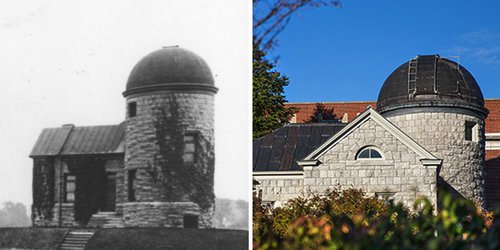
Journey through time and explore the fascinating history of Holden Observatory. A building few students on campus visit during their time on the Hill, Holden is the second-oldest building on campus, and has a celebrated history all its own. Holden is more than just a landmark of the past, however; it is a window to the future, too.
Robert Searing G’12, ’16, curator of history at the Onondaga Historical Association, discusses the history of Holden Observatory, from the visionaries behind its creation to its legendary trip across campus after it was built.
The Great American Solar Eclipse

With the moon passing between Earth and the sun and blocking the sun’s light from reaching Earth, darkness in the middle of the daytime causes all of us to take pause and wonder at the movements of the stars, moon and sun. On April 8, a large portion of North America will be in the path of totality during the solar eclipse, including Syracuse. Syracuse University astronomers and physicists will be taking advantage of this rare opportunity to observe, wonder and appreciate the beauty of a total eclipse of the sun.
Denver Whittington, professor of physics, Jada Garofalo ’25, Julia Fancher ’26 and Nico O’Neill ’25 discuss what to look for on April 8, and how to enjoy the eclipse even if you aren’t in the path of totality.
The Man Who Invented the Renaissance - Giorgio Vasari's Art and Life
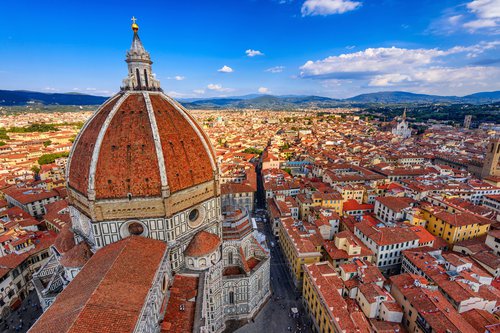
Considered the father of art history and one of the most important personalities of the Italian Renaissance, Giorgio Vasari (1511-74) is best known as the author of the “Lives of the Most Excellent Painters, Sculptors, and Architects,” a collection of artist biographies that was the first of its kind. He was also a prolific painter and successful architect whose patrons included popes, heads of state such as Florence’s Duke Cosimo I de’ Medici, leading intellects and religious institutions.
Sally Cornelison , professor in the Department of Art and Music Histories and director of the Florence Graduate Program in Italian Renaissance Art, delves into the fascinating history of Vasari’s life, going beyond the “Lives of the Artists” to explore his creative works and the ways in which he helped to shape artistic practice and the legacy of the Renaissance to the present day.
Monsters in the Movie Lab: The Longevity of Hollywood’s Classic Monsters

They’re infamous: Dracula. Frankenstein’s monster. The Invisible Man. These monsters have leapt off the page and onto the big screen. But more than that, these monsters have endured throughout the ages, and our fascination with them today is just as prevalent as it was when they first burst on to American culture. What can these legendary figures of film tell us about film history?
Will Scheibel, associate professor in the Department of English, discusses some of the monsters who have haunted our imaginations starting in the 1930s and continuing through today, how these iconic monsters came to be the “Universal Classic Monsters,” evolved a brand identity in the early days of movie studios, and have kept us up at night throughout the eras of television, home video, and contemporary entertainment.
Sonic Signatures: The Rise and Fall of Alternative Music in the 1990s

The ‘90s is marked by a sonic signature all its own, and one that couldn’t have taken place at any other time in history. Theo Cateforis, associate professor of music history and cultures, dives into the world of alternative music in the 1990s. His research into the unique and distinct sounds of alternative rock reveals more than what the ear can hear: What is alternative rock, and how does it differ from its musical predecessors? What themes and messages define this period, and what musical stylings are used to drive these points home? How did the culture of the 1990s influence its music, and vice versa?
The Hall of Languages at 150: Celebrating a Syracuse Icon
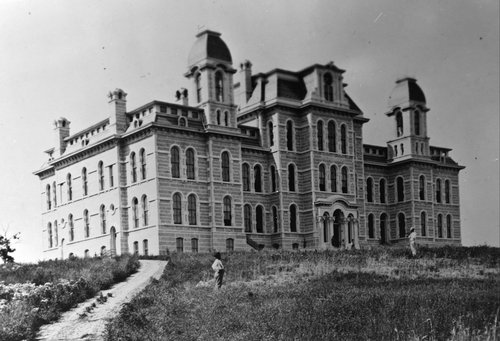
The Hall of Languages is one of the most recognizable buildings on the Syracuse University campus. Dedicated on May 8, 1873 as the first building on campus, HoL has served as the home of the College of Arts and Sciences (then the College of Liberal Arts) as well as the heart of Syracuse University for the past 150 years. In that time, it has captured the imagination of countless students, alumni, parents and friends of the University. From its unique architectural style, to housing a natural science museum, to being the academic hub of campus, the Hall of Languages is synonymous with Syracuse University.
Robert Searing G’12, '16, curator of history at the Onondaga Historical Association, shares the history of the Hall of Languages, guiding us from HoL’s humble beginnings through its legendary status on the Hill as we celebrate the 150th anniversary of the dedication of this iconic landmark.
“I will be free…in words:” Shakespeare’s Women and Cancel Culture
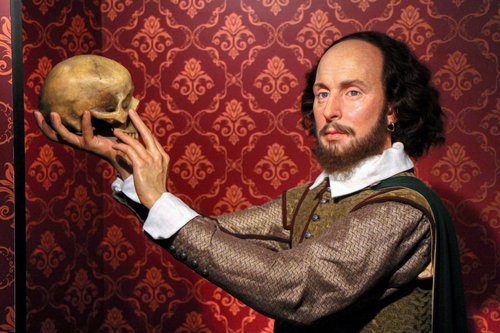
The works of William Shakespeare have stood the test time, and they form a cornerstone of our teaching of English literature. While Shakespeare’s treatment of race and gender has long been a subject of discussion among academics, the issue has come into sharp focus recently as part of the so-called “cancel culture” phenomenon. Take, for example, one recent instance in which Shakespeare has become the target of certain cultural critics: renowned British actress Juliet Stevenson (Truly, Madly, Deeply; Emma; Bend It Like Beckham, Departure, The Letters), argues that some of his ostensibly offensive plays should “just be buried.” She includes among them the allegedly misogynist The Taming of the Shrew.
But is this criticism justified? Professor Dympna Callaghan, University Professor and William L. Safire Professor of Modern Letters in the Department of English, offers her take on the question in "'I will be free . . . in words:' Shakespeare’s Women and Cancel Culture.” Why does Shakespeare’s representation of the stifling of women’s speech paradoxically give rise to significant instances of female expression? What about the argument that the social condition of women is so often thematically central to Shakespeare’s works, while women’s opportunities for speech and, conversely, their enforced silence, are especially significant in The Taming of the Shrew?
Your Top 10 OTC Hearing Aid Questions Answered!

Over-the-counter (OTC) hearing aids have made big news over the past year, offering a device that had previously required a visit to an audiologist, while also promising lower prices. Now that OTC hearing aids have been on the market for a while, patients face more and more questions as they decide the best option for them to address hearing loss. Are all OTC hearing aids the same? How can you evaluate if an OTC hearing aid is for you? Is there such a thing as an OTC hearing aid comparable to a prescription one, or do you get what you pay for?
Dr. Tammy Kordas and Dr. Kristen Kennedy from the Department of Communication Sciences & Disorders (CSD) answer some of the commonly-asked questions surrounding OTC vs prescription hearing aids, and share how their work in CSD’s Gebbie Clinic can help patients decide which devices are appropriate for their hearing loss and listening needs.
All Play and No Work? The Role of Gaming from Senet to Fortnite

The ancient Egyptians played Senet while Monopoly and chess remain popular today. Board games have brought people together for centuries. Video games have had a place in our hearts and homes for decades. Today, esports and richly immersive interactive worlds in virtual reality (VR) and augmented reality (AR) are proving themselves to be the next wave of gaming.
Christopher Hanson, associate professor of English, discusses games and their past, present and future in our society. Hear about the field of game studies; how games can shed light on culture and history; and how studying games allows us to explore not only new worlds, but ourselves.
A Conversation with George Saunders G'88 and Provost Gretchen Ritter
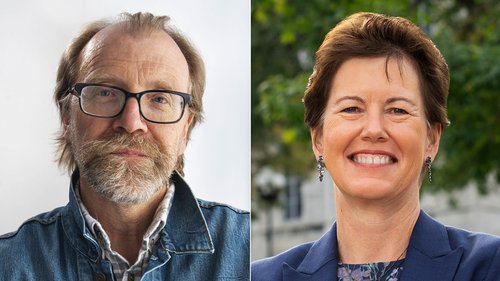
Called the “best short-story writer in English” by Time, George Saunders recently released his latest collection of short stories. Liberation Day delves into ideas of power, ethics, justice, and community, and what it means to be human.
In this installment of A&S Alumni Academy, Professor Saunders and Provost Gretchen Ritter discuss his newest book, teaching in the Creative Writing program, and how being human is one of the most powerful forces on the planet.
Jewish Humor and Satire
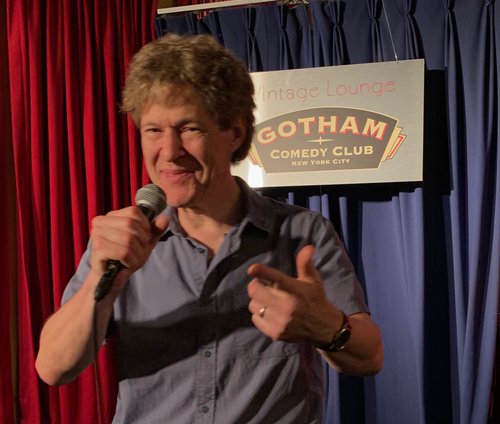
What began as a study of Jewish jokes and Jewish literature now culminates in stand-up comedy performances. Join Ken Frieden , B.G. Rudolph Professor of Judaic Studies, to dive into the history and theories of Jewish humor as viewed through analyses of literary works, stand-up comedy, early Yiddish movies and American films.
(Image: Ken Frieden at Gotham Comedy Club)
From Holden to Webb: Telescopes, Windows on the Heavens
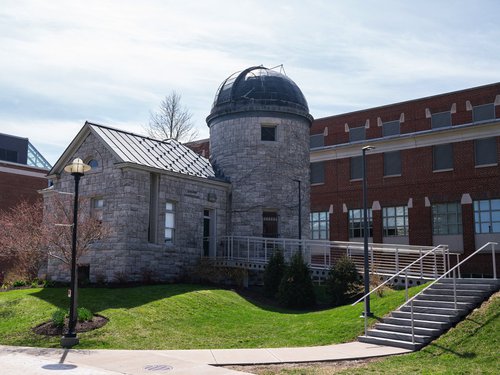
Humanity has been treated to the amazing pictures coming back from the James Webb Space Telescope. But why is this telescope better than Hubble? Why put telescopes in space in the first place? What are they good for, and how do they illuminate our place in the cosmos and the origins of the Universe?
Join Walter Freeman, associate teaching professor of physics, to explore the basics of telescopes, how they have evolved since the brass treasure atop Holden Observatory, and how each advance in the design and technology of telescopes has advanced our understanding of the Universe.
Are College Athletes Exploited?

Everywhere you turn, the question arises: Are college athletes being exploited by the college sports industry? How does the tradition of amateur, intercollegiate athletics balance against the commercial nature of today’s sports landscape? Professor Ben Bradley, the Allan and Anita Sutton Professor of Philosophy, will share some of the questions he poses students in his popular Philosophy of Sport class, and how he encourages those students to apply philosophical principles to thinking about and understanding current issues in the world of sports.
An Old Syracuse House, a Midlife Crisis, and American Decline: Dana Spiotta and Jonathan Dee Discuss Her New Novel, Wayward
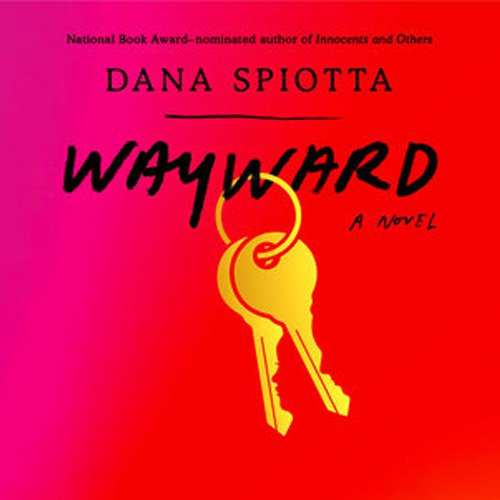
Professor Dana Spiotta’s novel Wayward was selected as a New York Times Top Book of 2021. A “love letter” to Syracuse, Wayward is a moving, funny, engrossing novel about mothers and daughters, and one woman’s midlife reckoning. Professor Spiotta is joined in conversation by Professor Jonathan Dee, Pulitzer Prize finalist and author of The Privileges and A Thousand Pardons.
The Next Wave: How Forensics Can Help Understand Virus Mutations

What is a virus mutation and why does it matter? How does a variation challenge what we know about a virus, be it the coronavirus or the annual flu, and how do we plan to stay ahead of it? And how does forensics play a role in our understanding of this phenomenon?
In celebration of the College of Arts and Sciences’ sesquicentennial, join Kathleen Corrado, James Crill ’07 and Michael Marciano ’18 Ph.D. from the College’s Forensic and National Security Sciences Institute (FNSSI) to learn more about virus mutations, and the light that forensics can shed on mutation mysteries.
Picturing the Italian Renaissance Woman: Artists, Images and Patrons
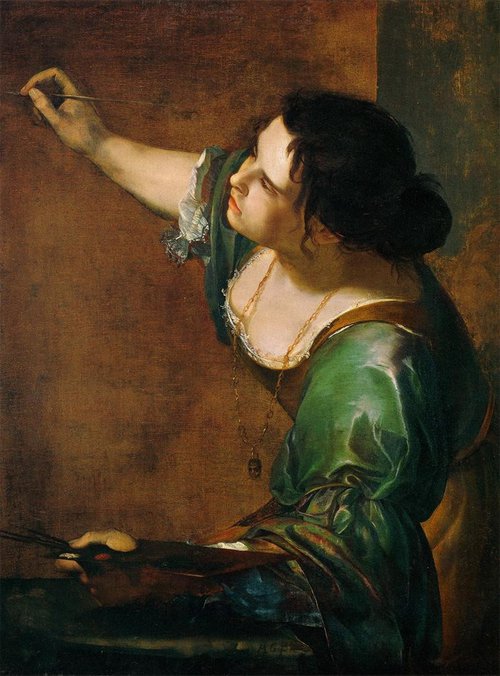
Did women have a Renaissance? The answer is a resounding yes, but only relatively recently have scholars begun to explore in depth the relationship between women and the visual culture of the Italian Renaissance (c. 1300-1600). Originally presented on April 16, 2021, in celebration of the College’s sesquicentennial, Sally J. Cornelison G’93, Professor of Art History and Director of the Florence Graduate Program in Italian Renaissance Art, spoke about the role women played as patrons, viewers and creators of art during this seminal period in history.
(Image: Self-Portrait as the Allegory of Painting by Italian Baroque artist Artemisia Gentileschi)
Black Holes and Gravitational Waves: Using Einstein's Legacy to Explore the Universe

Gravitational waves are one of the most remarkable predictions of Einstein's theory of general relativity. Einstein’s theory predicted that a pair of black holes orbiting around each other create ripples in the fabric of spacetime. Traveling throughout the universe at the speed of light, these gravitational waves tell us about the nature of black holes and contain clues about how they were formed.
Today, researchers in the College of Arts and Sciences are using the legacy of Einstein to answer some of the biggest questions in the universe including: How do stars live and die? How does the universe make elements like gold and platinum? How does gravity work?
In celebration of the College’s sesquicentennial, Duncan Brown, Charles Brightman Endowed Professor of Physics, graduate student Amber Lenon '16 and Laurel White ’21 shared how their research is re-framing and answering fundamental questions about the origins and evolution of the universe.
Reading, Writing and Teaching Stories
Reflections on inspiration and the creative process with SU professors George Saunders G’88 and Mona Awad.
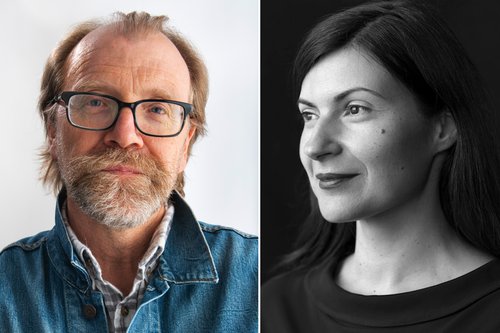
Where does inspiration strike? How do authors go from the idea to written page? How does fiction shape our worldview, especially in troubled times?
Originally presented on March 17, 2021, George Saunders G’88, professor of English, and Mona Awad, assistant professor of English, took on these questions and more. From teaching classes, to learning along with their students, to their creative process, to their new books (George’s A Swim in a Pond in the Rain: In Which Four Russians Give a Master Class on Writing, Reading, and Life and Mona’s much-anticipated new novel, All’s Well), George and Mona’s conversation explored the craft of writing; the methods by which they work, what “inspiration” means to them, and how the craft is to be passed on to the next generation of young artists.
(George Saunders photo credit: Zach Krahmer; Mona Awad photo credit: Brigitte Lacombe)
The CRISPR Revolution and Its Ethical Mysteries

Eradication of fatal diseases, the raising of better crops and livestock, and designer humans. CRISPR gene editing technology promises to revolutionize our lives. But, as with all new technology, with the potential for life-changing advances comes the potential for misuse as well as unintended consequences.
On January 14, 2021, Samuel Gorovitz, professor of philosophy, and Hille Paakkunainen, associate professor of philosophy, discussed some of the ethical questions surrounding CRISPR genome editing.
Tastes, Traditions and Trends of Tea
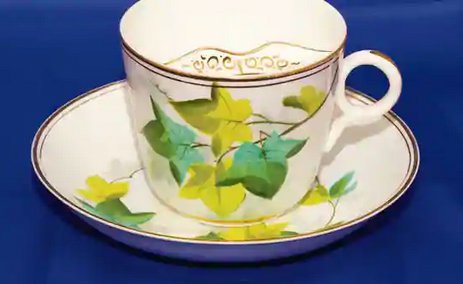
Learn about the history of tea and explore its variety of leaves, health benefits, types, origins and tea plantations. Discover the evolution of tea, and hear about the future of a beverage that, after thousands of years, is continuing to reinvent itself.
Presenters include: Todd Rubin ’04, Minister of Evolution (President) for The Republic of Tea, which is known for its innovative blends; Tim Takacs ’92, co-founder of Marulin tea company, that specializes in Taiwanese tea; and Romita Ray, associate professor of art history in the College of Arts and Sciences.
The CRISPR Revolution

In December 2020, James Hougland, associate professor of chemistry and biology (by courtesy), Kate Lewis, the Laura J. and Douglas Meredith Professor for Teaching Excellence and department chair of biology, and Peter Fioramonti '21, undergraduate researcher in the Hehnly Research Lab, gave an online presentation on how genome editing is transforming the life sciences.
The Art of Black Women's Wellness
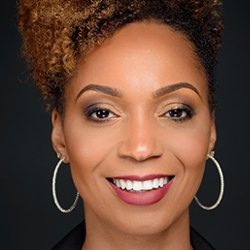
On September 10, 2020, Tanisha Jackson, Professor of Practice in the Department of African American Studies and Executive Director of the Community Folk Art Center, gave an online presentation on the art of Black women's wellness, discussing social justice and equity via the arts. Jackson examined how Black women artists facilitate wellness for themselves and others through narratives within their artwork.
K-12 Education in the Era of COVID-19
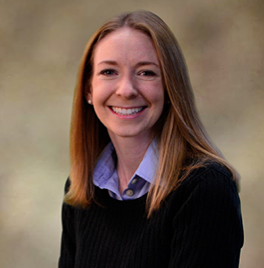
On August 20, 2020, Bridget O'Neil Hier, assistant professor from the Department of Psychology, discussed in-person vs. remote/distance learning, the impact of educational instability and strategies to support student learning for students in grades K-12 in the era of COVID-19. Hier’s research focuses on developing effective, efficient instructional practices to improve children’s academic outcomes.
The Future is Alive - Why Physicists are Studying Biology
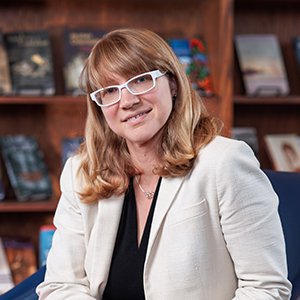
On May 28, 2020, Jennifer Ross, Professor and Chair from the Department of Physics, highlighted the ways physicists are working to create new materials that have properties of living systems.
